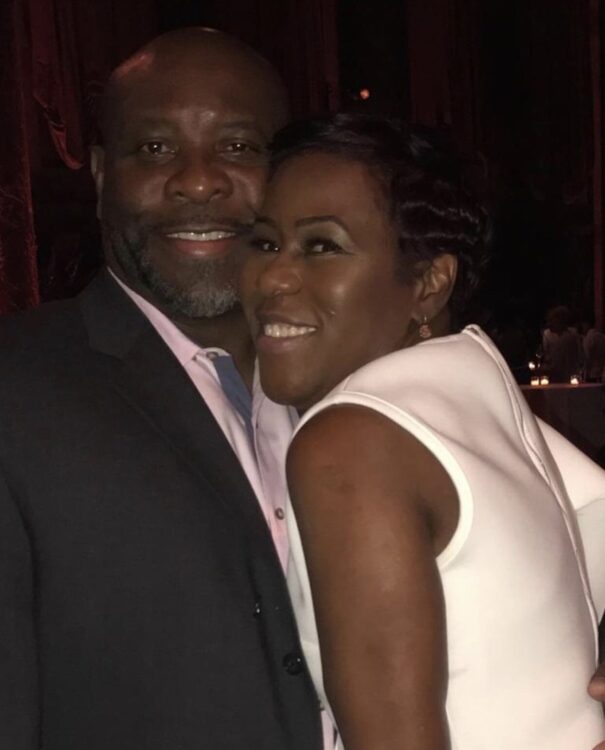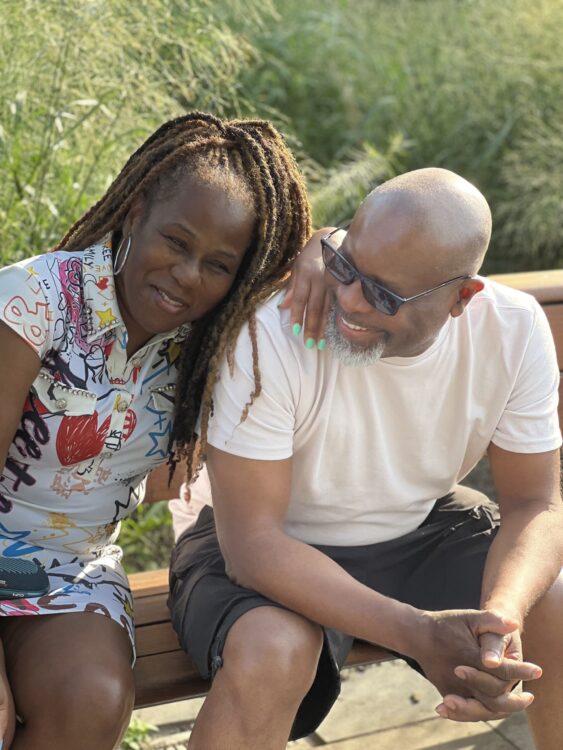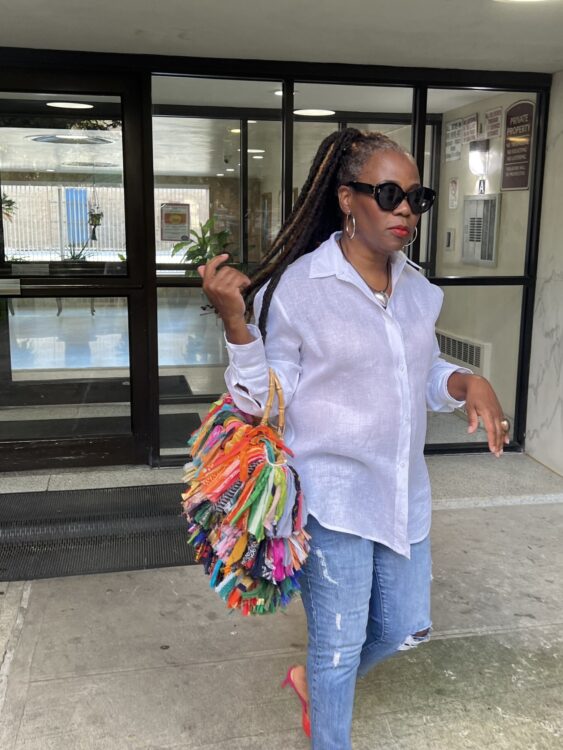Colette lives in the Bronx, NY, with her husband, Fitzroy, who is also a cancer survivor. They have 4 adult daughters, Tessa, Jessica, Kaelani, and Kayla, and a son, Josh, who recently left the nest for art school. They also have 2 grandchildren, Nicholas and Kobain, who keep them quite busy. Colette has a keen eye for fashion and is attracted to brightly colored, eccentric apparel. She enjoys music of all genres, especially reggae and soca. A good book is how she enjoys quiet time.
Colette is currently in her 1st year of a Master of Public Health program at The City University of New York’s School of Labor and Urban Studies. She is a 30-year healthcare veteran and serves on several advocacy committees, including Mount Sinai’s Protocol Review and Monitoring Committee (PRMC), where she is responsible for the scientific and feasibility review of cancer-related protocols consent forms. Her sights are set on disrupting the status quo in the world of lung cancer.
My diagnosis
I have always said that my lung cancer diagnosis was an act of God because I only learned that I had lung cancer after being diagnosed with another condition called arteriovenous malformation (AVM). I experienced heart palpitations after having a procedure to treat my AVM and took myself to the emergency room. While there, I had a CT scan to make sure I hadn’t developed a blood clot. During that scan, they saw nodules in my lungs.
My primary care physician suggested that I have another scan in 4 months, and when I did, the nodules were still there. After that, I had a PET scan, which showed nothing.  On the advice of a friend who was living with colon cancer, I sought out the opinion of a thoracic surgeon who told me that he suspected my nodules were lung cancer. My biopsy results were inconclusive, so we decided to proceed with surgery to take out the tumor and test it while I was under anesthesia. If the test showed cancer, he’d go ahead and remove the upper left lung right then. This is ultimately what happened, and I was diagnosed with stage 1A (IA) lung cancer.
On the advice of a friend who was living with colon cancer, I sought out the opinion of a thoracic surgeon who told me that he suspected my nodules were lung cancer. My biopsy results were inconclusive, so we decided to proceed with surgery to take out the tumor and test it while I was under anesthesia. If the test showed cancer, he’d go ahead and remove the upper left lung right then. This is ultimately what happened, and I was diagnosed with stage 1A (IA) lung cancer.
Before they confirmed that I had lung cancer, I was incredibly anxious, even frantic. However, once I received my diagnosis, I felt oddly relieved. I think I needed to feel some control over what was going on with my body, and confirming that I had lung cancer allowed me to say, “OK, let’s do something about it now!”
Now what?
It’s been 9 years since my diagnosis, and I have been getting scanned regularly ever since – twice a year for the 1st 5 years and once a year since then. Luckily, all the nodules we have been watching have been relatively stable, but I just wasn’t comfortable with a “wait and see” approach to the future. I have known too many people whose lung cancer returned many years or even decades after they were considered cured. I wanted to know what I would do if my nodules were to become lung cancer.
I found a lung cancer specialist at Columbia Presbyterian who I have come to really trust who specifically studies EGFR Exon 20, which is the lung cancer mutation I have. We discussed a possible treatment plan should I come to need it some day. I also had a blood biopsy to look for cancer in my system, which came back negative. That was what I needed – a proactive diagnostic intervention to help me feel more secure in my good health. Before that, the uncertainty was causing me sleepless nights, but now I feel like I can better relax because I have more data and a plan for the future.
Giving back
I grew up in the Virgin Islands in the 1970s and, like a lot of people all over the world, we listened to the singer Bob Marley. He has a lyric in the song “So Much Things to Say” that goes, “When the rain falls, it don’t fall on one man’s housetop.”  I have always believed that he is saying that in a community, we are all accountable and responsible for each other. I believe that I have a responsibility to my community – Black Americans, Black women, and people living in the Bronx, especially – to educate and advocate for them and to raise awareness about lung cancer.
I have always believed that he is saying that in a community, we are all accountable and responsible for each other. I believe that I have a responsibility to my community – Black Americans, Black women, and people living in the Bronx, especially – to educate and advocate for them and to raise awareness about lung cancer.
I am especially passionate about lung cancer as it relates to people with no smoking history, like me. No one deserves lung cancer, regardless of their smoking history, but for those of us who never smoked, we have no recourse. We can’t get screened because we don’t qualify. There’s no testing. It’s just something that takes most of us by surprise and typically at a later stage when it’s harder to treat.
There must be something more for people like me – some option for testing or screening that can save more lives. I want to be part of that movement. I want to be that voice. Our current options aren’t good enough, and I want to help to spearhead those changes. In fact, I’m even taking a course to study policy as it relates to health. I have also attended GO2’s Lung Cancer Voices Summit in Washington, D.C. to be a voice for my community to our elected leaders. It’s the most important thing to me.
Advice to others with lung cancer
The 1st thing I would say to someone receiving a lung cancer diagnosis today is to find someone that you are comfortable with – a spouse, a friend, a family member – who can be your advocate.  When you’re 1st diagnosed and in the thick of it, you need someone with a clearer head to ask the right questions, retain the information, and look out for your best interests. I also recommend meeting as many doctors as you need to in order to feel comfortable with your care team. Get a 2nd, 3rd, or 4th opinion – as many as you need to be confident moving forward.
When you’re 1st diagnosed and in the thick of it, you need someone with a clearer head to ask the right questions, retain the information, and look out for your best interests. I also recommend meeting as many doctors as you need to in order to feel comfortable with your care team. Get a 2nd, 3rd, or 4th opinion – as many as you need to be confident moving forward.
It’s also so important to find the gift within your diagnosis. In many ways, lung cancer taught me how to live. In some respects, it saved my life. I think you can either find gratitude in the lessons you learn from a bad experience, or you can let it take you down. I wasn’t going to let that happen. So now, I find joy in every single part of life. I don’t miss a thing. Little things that I wouldn’t have even noticed before are so beautiful to me now. The smallest joy can make your whole day better if you let it.
Join Colette and other advocates at the 2025 Lung Cancer Voices Summit, March 9-11 in Washington, D.C., to help change this disease from one of stigma to one of hope.

Your story gives me hope! I’m a now single woman after being in a relationship for 8 years. I hadn’t realized how much my life revolved around him with not having close girlfriends as I normally had had. Now I’m reconnecting with women in my community and many have been so wonderful in offering words of support. This diagnosis has made me realize how my life needs more balance and I need to give back to my community.
Hi Bette! Happy to hear that my story gives you hope. I don’t think it’s uncommon to become involved in a relationship to the extent that other relationships fall off however it’s great that you are reconnecting with old friendships. Along with everything else please remember to give yourself grace. You deserve it. Sending warms thoughts your way and I hope you are doing well. ❤️